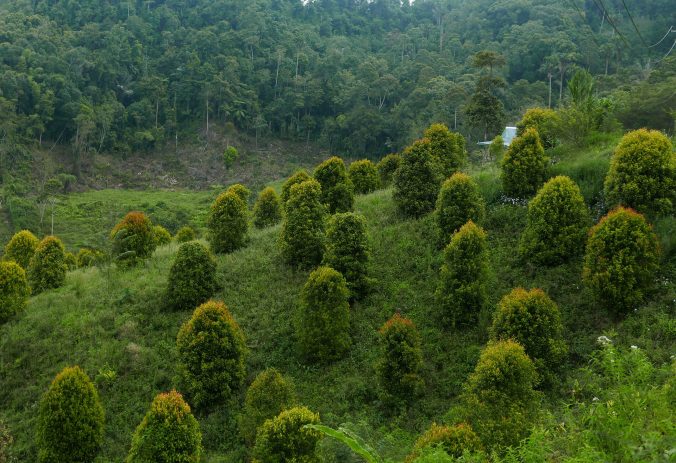Clove plantations were forbidden by the seventeen century Dutch outside a few islands in the Moluccas to preserve their monopoly.
Along with other ‘spices’ cloves (Syzygium aromaticum) were part of the driving force behind the rush by the European seventeenth-century colonising nations, including the Dutch, British and Spaniards to find a passage around Cape Horn to ‘claim’ parts of southeast Asia and exploit the ‘spices’ and ship them back to Europe where they were valuable and a welcome improvement to traditional diets.
Cloves are one of the prized spices traded since ancient times through a long chain of seafarers and merchants between the “Spice Islands” of the East Indies and Europe. They are the dried aromatic flower buds of the species of Syzygium, one of the largest tree genera of the world, with about 1000 species.
The powerful oil of cloves, eugenol, is concentrated in the drying buds, and has both antiseptic and aesthetic properties as well as penetrating flavour.
Most Syzygium species have low concentrations of essential oils. The clove is an exception. Its powerful oil, eugenol, concentrated in the drying buds, has both antiseptic and aesthetic properties as well as penetrating flavour. Cloves are commonly used as a spice flavouring or fragrance in consumer products, such as toothpaste, soaps, or cosmetics. Cloves are available throughout the year owing to different harvest seasons across various countries.
Clove trees are a member of the family Myrtaceae. They are native to the Maluku Islands (or Moluccas) in eastern Indonesia and can grow up to a height of 18 metres.
Cloves are still one of the best painkillers for toothache. It is also the additive that gives Indonesian kretek cigarettes their distinctive smell. These cigarettes were smoked throughout Europe, Asia, and the United States.
Clove plantations were forbidden by the seventeen century Dutch outside a few islands in the Moluccas to preserve their monopoly. They were later established in several parts of the wet tropics.
Cloves are used in the cuisine of Asian, Mediterranean, and Middle East countries, lending flavour to meats, curries and marinades, as well as fruit. Cloves are also used to give aromatic and flavour qualities to hot beverages, often combined with other ingredients such as lemon and sugar. They also pair well with cinnamon, allspice, vanilla, star anise and peppercorns.
Along with other ‘spices’ cloves were part of the driving force behind the rush by the European seventeenth-century colonising nations to ‘claim’ parts of southeast Asia and exploit the ‘spices’ and ship them back to Europe.
Clove essential oil can be used to inhibit mold growth on various types of foods. In addition to these non-culinary uses cloves can be used to protect wood in a system of cultural heritage conservation, and showed the efficacy of clove essential oil to be higher than a boron-based wood preservative.
Cloves can be used to make a fragrant pomander when combined with an orange. When given as a gift in Victorian England, such a pomander indicated warmth of feeling.
